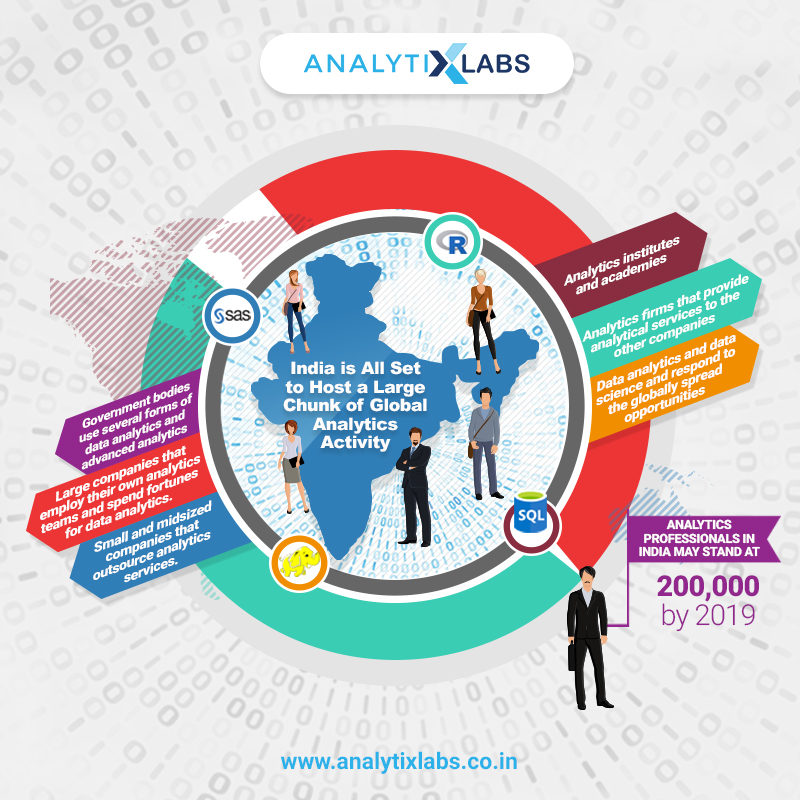 It looks quite satisfying that India has been growing steadily for quite a few years when it comes to Economy and industry. The industrial development that currently characterizes India is really a blessing for the youth and a great assurance of a great future. It is quite obvious that we shall focus on the ebb and flow of the dynamic analytics industry that has been taking shape in India through most of this decade.
It looks quite satisfying that India has been growing steadily for quite a few years when it comes to Economy and industry. The industrial development that currently characterizes India is really a blessing for the youth and a great assurance of a great future. It is quite obvious that we shall focus on the ebb and flow of the dynamic analytics industry that has been taking shape in India through most of this decade.
We can generally divide the industry in a few blocks.
- Large companies that employ their own analytics teams and spend fortunes for data analytics.
- Government bodies that use several forms of data analytics and advanced analytics.
- Small and midsized companies that outsource analytics services.
- Analytics firms that provide analytical services to the other companies, both in India and abroad.
- Analytics institutes and academies.
This is basically a delineation of the domestic analytics industry – quite generalized and rough although sufficient for our understanding of the outline. This whole body employed roughly 50,000 people according to an industry report created in 2016. We can expect this number to have grown considerably. The promising thing about this is the fact that while several global events threat the market for outsourced jobs the domestic industry is creating considerable number of opportunities.
We can be optimistic about the global reach of the industry as Indian has always been identified as a pool of cost effective and reliable talent. The analytics services offered by Indian firms are also quite cost effective. Currently more than 200,000 Indian analytics professionals are working as outsourced employees. This number also is likely to grow up as a global skill gap still remains and Indian talents are coming up fast. This is a great time for the young aspirants to come forth, get trained in various strata of data analytics and data science and respond to the globally spread opportunities.
The highest demand is for the professionals with a trilingual skill set – professionals well versed in analytical modelling, technology and business acumen.
Your chances of getting placed increase if you have skills for data management, data visualization, advanced modelling, etc. Domain knowledge and creativity can also add to your chances. The tools and technologies that you can use vary from company to company. While the larger and midsized firms use SAS, Hadoop, SQL etc, the smaller firms and startups prefer to go with R instead of SAS owing to the cost effectiveness of an open source software suit like R.
Currently the Indian analytics industry is thriving with Bangalore in the lead. 29% of all domestic analytics activity in India hails from this single city. It is currently the best place to get placed or to get trained. It is often noticed that fresh graduate engineers line up in Bangalore for job opportunities, and why not? Bangalore is and has been creating the highest number of technological jobs in India. Analysts in India usually start with a salary of INR 4-6 lakhs per annum, which is quite impressive for industry standards. For an employee with experience of 4-6 years the average salary ranges from 9-15 lakhs. These figures can obviously vary according to your skill set and the industry you are working in.
If you can handle both big data and data science projects, you surely have an additional demand and the average salary starts from 13.5 lakhs. Having Python, SAS, SPSS and R, in your skill set makes you a rare asset for a company.
Bangalore not only offers the best job opportunities for professionals but also extends the best training for students and professionals. SAS training in Bangalore is available at the highest level. In order to make most of your career, it is suggestible that you do not skip SAS training. It is among the few tools that can be useful when you are looking for a better opportunity with a higher pay.
The current time is exceptionally fruitful for Indian analytics professionals. The skill shortage of analytics professionals in India may stand at 200,000 by 2019. We can expect a large chunk of the global analytics activity to hail from India. That will need a constant supply of well trained analysts, data architects, data managers and data scientists. The Indian youth must respond to this and be part of the thriving analytics workforce.






